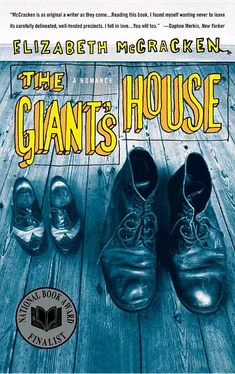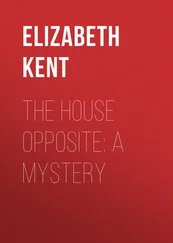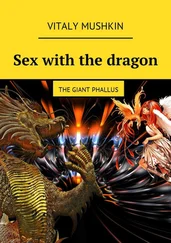I’d like to say that, at that moment, I was crying for James, that I’d fully realized his absence by sleeping with the man who, all things considered, might be expected to be most like him, but who was nothing like him at all. I’d like to say that, as I cried, I completely forgot about that balding man outside the door, who knocked once or twice, politely, as if he were overhearing a domestic dispute that he wasn’t sure he should interrupt.
In fact I was crying for myself. I was an idiot, and while that wasn’t the worst thing — most people are idiots — for some reason I was an idiot who would be lonely the rest of her life. An idiot who had believed, briefly, foolishly, based on nothing, that this might not be so.
Through my tears and the shower I heard my front door open and close; I was listening for it. I waited ten minutes — not crying now, just listening to make sure he was gone — then put on my robe and went into my living room.
I’d expected my apartment to be wrecked. By what I’m not sure, by whatever had happened last night, by Cal this morning. I’d half hoped he’d turn out to be a common thief, a man who’d take advantage of a hysterical but private woman by silently removing her valuables. But my apartment was as orderly as ever, and the only thing Calvin Sweatt had helped himself to was tomato juice; the glass, still glazed red, was upside down in the sink. I imagined he’d probably dribbled some down his shirt.
There was a note on the kitchen table.
PEGGY I hope you are ok I thought I should go I didnt take any pictures you could send me ones you wanted to me Caroline has my adress in NYC thanks I like the one in the bathroom mirrer And maybe a picture of you too if theres any thanks I’m sorry you feel this way Cal
You can’t hide a fire behind paper. This sounds like something a mother would say, some piece of wisdom, although I don’t know that it is. Before James died, if someone had said that to me, I would have said, Yes you can, if you work hard enough. If you lay a book down on a fire, wait until the flame has almost bit its way through the top cover, then quick throw down another one, maybe you can hide it. It might take diligence, but I was always a diligent woman.
For years I tried to hide a fire with books, endless books. I think I was born with a little grief in me, a sadness, not unlike Mrs. Sweatt’s. I tried my best to hide it. All I did was succeed in making the fire hungrier to finally burst out big. I can’t say that I think it did the books too much good either.
Peggy, you might say to me, didn’t you think the fire would burst around, creep up the binding? All those words just wicks? Fire is a speed-reader, which is why the ignorant burn books: fire races through pages, takes care of all the knowledge, and never bores you with a summary.
I would have said: maybe your fire. But I know my life, and it is a small, hesitant thing. I thought then that the smallest thing in the world would put out the flame, and I had one of the biggest. And then suddenly, he was gone, and I had nothing left to throw down.

That Saturday afternoon, the one after Cal Sweatt drank his tomato juice and moved on, I wept, wretched. I sat in all the chairs in my apartment, stopped weeping long enough to stand up, walk to a new chair, and sit. Then I started crying again. Sometimes I quit just long enough to laugh at myself, the mess I was.
Around four o’clock I got up, took a shower, got dressed in my old gummy clothes. I washed the upturned glass that Mr. Sweatt had left in my sink and filled it with cold milk, then took it back to the table. What I really wanted was whiskey. I don’t think I’d had one since Mrs. Sweatt and I, seven years before, had ducked into that Provincetown bar. Sitting in my kitchen, I imagined the way whiskey would ease down my throat, the immediate warmth that followed it, first head, then body, slow enough that by the end of the drink I wouldn’t remember the start of it, wouldn’t even feel grateful. I’d just be warm and happy and unbelieving I’d ever been anything else.
That was what real love must be like, I thought. Most people get it, most people are used to it. Me, here I was, hung over with something that hadn’t even been love. Probably I should swear it off, like an alcoholic. I should just vow never to try it again in my life. I didn’t see it ever being offered, anyhow.
I felt left. I felt abandoned. And until that moment in my kitchen, looking at my spinster’s glass of milk, I honestly believed that it was James’s father who had left me, that it was a man who couldn’t bring himself to use a comma saying, I have to go to Albany, that did this to me. I was amazed the way a child is amazed to discover, holding his thumb to his eye, that he can blot out a mountain.
I thought work would take my mind off its awful machinations, all the things I should have done that would have prevented everything: James’s death, Mr. Sweatt’s return, all that followed. That was what I called it, to myself, all that followed .
But the library made me sick. Every day was a little worse, until a month later I could hardly stand it.
It was a Friday, and April, and the building seemed toxic: the brown dust the books gave off, the tropical dampness of the ladies’ room, the cracked glass panes in the floors in the stacks that, at the merest suggestion of a footfall, might drop their burden — a patron, me — down to the basement. The patrons sickened me, too. More books! They dropped off their books and demanded more, they spied a best seller and wanted it then , never mind the waiting list. Even the books disgusted me that day. Their jackets were plastic-wrapped, to keep clean, and that struck me as sleazy, that they were doing things they needed to be protected from. Library books were, I suddenly realized, promiscuous, ready to lie in the arms of anyone who asked. Not like bookstore books, which married their purchasers, or were brokered for marriages to others. Now my books seemed so filthy, physically filthy, that I didn’t want to touch them; usually, when a book seemed unclean, I washed the covers with a soft waterless soap made for the purpose. Now I picked them up gingerly, threw them on the distribution shelves for Darla.
I forgave no fines that day. I searched for no titles for the curious. When one woman came back for a book she’d returned half an hour before, thinking she’d left a letter between the pages, I thought about telling her she’d just have to wait until the book had been reshelved, because I sure as hell wasn’t going to look for it. But I hadn’t turned that wicked yet. It was a philosophy book, which meant that I’d tossed it up on the highest of the shelves behind the desk. I got a footstool and stepped up, and it was then, reaching, a foot off the ground, that I did a little arithmetic.
I grabbed the book, found the letter, and brought it to the woman. She thanked me, sounding a little afraid.
I went to the doctor for a long lunch hour to set facts straight. The fact was this: I was pregnant.
Maybe I wanted to be; maybe in the back of my mind I’d planned it, thought this was one thing Calvin Sweatt could give me: those genes. A baby with those remarkable genes. Not as a replacement for James, but a reminder. My life was over and I wanted a new one. No better way, as I thought about it.
I felt my body suddenly. Was that so bad? I’d been absent, for years it seems. I’d set up residence in James’s body, and there was room there for me. He didn’t use all of it. Plenty of space. And when I went to kiss him that night — James, I mean, not his father — when I leaned forward, punched my arm into the pillow, I still wasn’t in my body, I was trying to pay back rent, I was begging not to be evicted, I was knocking on a door I knew was about to be locked, saying, Just another minute, wait, I’ve packed, I know, put off the demolition, I just want one more look around . And he let me, and then he died.
Читать дальше













